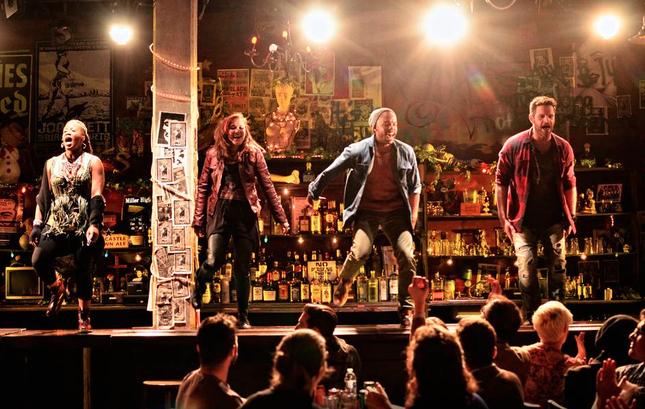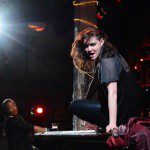Studio’s ‘Murder Ballad’: Lost Love in Your Face
By • May 11, 2015 0 1110

Hey, guys and gals, looking for something new, something to do, maybe hang out in a bar you’ve never been in before?
Check out “Murder Ballad,” the new show at Studio Theatre’s Stage 4, described as an “immersive rock musical experience,” which has been extended to May 16.
“Immersive” experiences aren’t exactly new, although they’re primed to be part of the ideas percolating as theaters look for ways to bring in new audiences. This one is a kind of rock opera or rock melodrama, mostly sung to music played by a stage-bound, sort-of, looks-like-feels-like rock band. It is surely immersive and thick with ambiance. The audience gets to order drinks and sit at tables, munch on popcorn while bartenders fix drinks, wield a bat, and all sorts of faded scribblings, graffiti and posters reel you in. The place, with a bright green pool table at the center where the characters in the play often come together or circle each other in a contemporary take on love gone bad, love recovered, love gone bad again with a bad outcome for somebody. It is, after all, called “Murder Ballad.”
I liked being there, truly—a beer, popcorn, urban audience and couples, young, younger and old and older, too, recalling the bad old days when 14th Street was a mess and not the restaurant-teeming, busy thoroughfare that it is today. Being at this show is a great opportunity for people watching, and the characters often stomp off angrily, and reappear elsewhere, from behind the bars, or off to the side or through the entrance.
Summing up quickly, “Murder Ballad,” set in New York, has as its center the fortunes and misfortunes of a slightly lost, appealing young girl named Sara, who strikes tough poses to avoid being hurt. She hooks up with a charismatic bartender and someday bar owner, named Tom, a guy who’s always been catnip for the girls, especially wounded sparrow types like Sara. They meet, and they hook up, passionately, until Tom, sensing that the word, “love,” might come out of his mouth by accident any day now, dumps her.
Horribly wounded, Sara is at sea, feeling hopeless, until along comes the appealing, caring Michael, a guy who really cares and has a real job, to boot. They meet, they love, they marry and they have a child. Soon, however, a restless Sara starts to pine for and remember Tom. “He made me weep,” she sings, as if this were a good thing. Predictably, Sara and Tom meet, they hook up, she feels horribly guilty. Michael feels betrayed. Tom suddenly thinks Sara is the one that got away, the love of his life, and sings, ominously “You Belong to Me”.
The story is told almost entirely through music, driving, often soaring songs like “Answer,” “You Belong to Me,” “I’ll Be There,” “Built For Longing,” “Sara” and others. The story’s driven by a kind of narrator played by the big-voiced Anastacia McCleskey, who is always there.
But truth be told, it’s Christine Dwyer who carries the show, musically, dramatically, as Sara. It’s Sara’s story after all, and Dwyer, slight of build, often guilt-driven, makes her presence felt. She can belt a ballad and carry a musical load, but it’s more than that. She’s one of these young female performers who’s got chops and charisma, a deceptive, and ultimately beguiling kind of charisma that touches heart and soul
Tammar Wilson, who’s the nice guy Michael, does gentle and angry equally well.
The show—conceived by and with book and lyrics by Julia Jordan and music by Julian Nash and directed with verve by Studio Theatre’s artistic director David Muse—is appealing enough. You even care about the people, and the ambiance alone is worth the price of the ticket.
This is not exactly new—the 1960s were full of shows that almost demanded that you be a part of the show, or occasions where body contact with the cast occurred, as it did with “Hair,” where cast members clambered over seats and ran through the aisles Studio in the past has used its new spaces the same way. There was a terrific show a number of years ago about Jack Kerouac and the beats, played out in a bar.
I’d like to have seen—not just immersion—but a little more direct contact from the cast with the audience. I don’t mean physical contact, but playing to the audience. If you’re this close to the action, things ought to be a little more personal or reactive. Opportunities sweep by, untaken.
But there is room for surprises. My lips are now sealed.
- Anastacia McCleskey, Christine Dwyer, Tommar Wilson and Cole Burden in Studio Theatre’s “Murder Ballad.” | Photo by Vithaya Phongsavan




